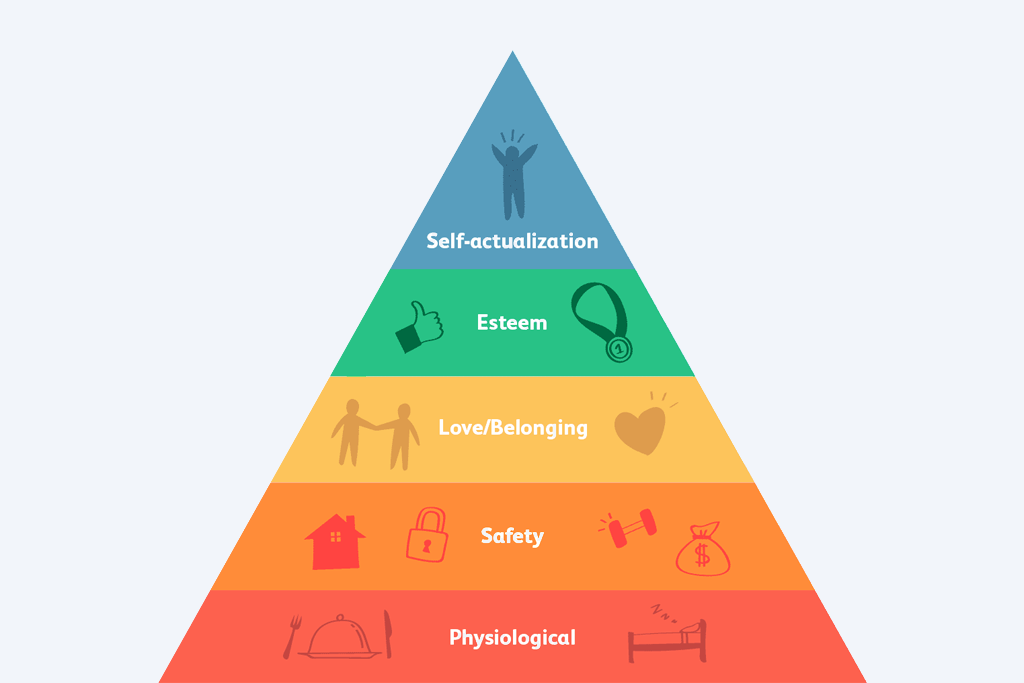A friend who is a life coach often asks on social media, what are you doing to practice self-care? My answer is usually, “More than you could possibly imagine.”
There are so many moving parts in my self-care repertoire that sometimes it feels a self-indulgent. But I’ve learned the hard way that if I neglect any aspect of it, not only do I pay the price, but the people who depend on me do as well.
Self-care is like an operating system that allows me to function, and if I don’t maintain it, the whole system could crash. I think of it in terms of the Hierarchy of Needs framework developed by psychologist Abraham Maslow more than half a century ago. Maslow’s Hierarchy of Needs is organized as a 5-level pyramid, with the most basic needs (the kind we share with animals) at the base, and those that make us fully human (creativity, self-actualization) at the apex.
Starting at the base level of Maslow’s hierarchy, here’s how I maintain my operating system:
Level 1: Physical Needs
Food – I spend a lot of time planning, shopping, preparing and cooking. I make sure there are plenty of meals in the freezer so I never have to say, “There’s nothing in the house to eat” and get take-out. Then there’s between meals. I get cranky when I’m hungry, so I make sure I always have healthy snacks with me.
Exercise – If I don’t exercise, I feel lousy, I want to eat more, and I want to eat worse food. When I exercise, I feel energetic and fit and happier all around. Exercise is like the amplifier that boosts the signal on everything good in my life.
Sleep – I struggle with this one, but it could be worse. I use the Sleep Cycle app on my phone to track both the quantity and quality of my sleep, and having that accountability measure keeps me from putting sleep last on my list.
Level 2: Shelter, Safety, Stability
My basic needs are covered – a house in a safe neighborhood, a job I’m not in danger of losing, a reliable car to get me where I need to go, enough money to cover basic necessities. I’m careful with money, track my spending so I don’t get that fearful feeling. I bought a cheaper house than I could afford so my mortgage payment would be lower. I say no to a lot of things I want because the feeling of safety and security gives me more happiness than the things I would buy. I have a maintenance category so that car and home repairs don’t make my budget fall apart.
My other scarce resource is time. As a single mother of four with a full time job, I have to mindfully budget time as well as money. Maslow’s focus in Level 2 was physical safety, but he created his hierarchy in a simpler world. There was no email, no internet, no social media, no 24/7 news. Most people worked the same 9-5 job for most of their career, and left work at the office. More women were stay at home mothers. There weren’t as many balls to keep in the air.
I keep up with housework, laundry, shopping, and decluttering and so I don’t get that “I’m drowning!” feeling. I hate that feeling. I hate it more than I hate cleaning when I’m tired. I’m careful about saying yes to new commitments. I try to be on time because running late makes me stressed and unhappy. To keep all the balls in the air, I use a modified version of the organizational system David Allen devised in Getting Things Done.
Level 3: Social Needs
My relationships with each of my daughters are the most important thing in my life, and I prioritize them. This creates a challenge in connecting with adult friends and family members, but I do what I can, even if it’s only by phone and text and messenger. Connection is a crucial human need, and we neglect it at our peril.
Level 4: Esteem
Maslow distinguished between self-esteem and esteem that comes from others. Self-esteem that isn’t based on achievement is meaningless, empty emotional calories. We tried giving every kid a trophy so no one would feel bad, so that the trophies meant nothing. We called the math groups red and blue instead of advanced and remedial, but the kids knew the score and went right on calling them the smart group and the dumb group. Parents told their kids they could be anything they wanted, but forgot to add, if you work your ass off.
Research suggests two solutions: 1) build your skills and accomplish things so that your self-esteem is justified, and 2) for basic, everyday feeling good about ourselves, we need self-compassion rather than self-esteem. Self-esteem is conditional, based on actual success, which is why parents and teachers couldn’t give it to kids just by telling them they were wonderful. Self-compassion is unconditional, and based on our having value simply by being human.
The kind of esteem that comes from others can be a heady brew – we get addicted to it, especially in the social media age, checking our phones constantly for likes and shares and affirmation that other people are noticing and approving of us. Comparing ourselves to other people and craving their approval is a recipe for unhappiness. Unfortunately, it built into our natures, since in our evolutionary environment, ostracism by the group meant starvation in a harsh physical environment or a bloody death in the jaws of a predator. The price of people not wanting to hang out with us could be death. Today, the price is emotional pain and anxiety.
Nowadays, “stop giving a fuck” is the thing. We’re supposed to stop caring what other people think, but that’s hard, because our ancestors’ friends who didn’t got kicked out of the tribe and eaten by lions. Because our great-times-a-thousand grandparents did give a fuck, they lived long enough to pass their craven, approval-seeking genes on to us.
I’ve come a long way on this one. I spent most of my life craving esteem, approval, and status. Now, I still get that please like me feeling, but I recognize it for what it is, and don’t base my choices on it.
Level 5: Self-actualization
At the pinnacle of Maslow’s pyramid is our need for creativity, meaning, and purpose. Once all of our other needs have been satisfied, we still feel a craving for more, for something intangible and often hard to identify. Viktor Frankl, my all-time favorite psychologist, wrote in his magnificent memoir Man’s Search for Meaning that the primary human need is for meaning and purpose.
Raising my children gives me a sense of purpose, as do learning and writing. Having a creative project, something goal-based, that doesn’t feel cyclical, kept me going while my kids were little, when it felt like life was an endless round of changing diapers, doing laundry, and sweeping up crushed Cheerios. It was writing that let me get into Flow, that state where you’re fully immersed in what you’re doing, and the rest of the world falls away. In Flow: The Psychology of Optimal Experience, Mihaly Csikszentmihalyi wrote that while caring for young children is absolutely a source of meaning and purpose, it isn’t conducive to flow because time and attention are necessarily so fragmented.
So, what do you do to make sure your pyramid is solid?


1 Comment. Leave new
[…] trouble than usual keeping my habits on track. This is a cyclical thing. There are times when my operating system functions like a well-oiled machine, and times when things go off the rails. Things aren’t […]